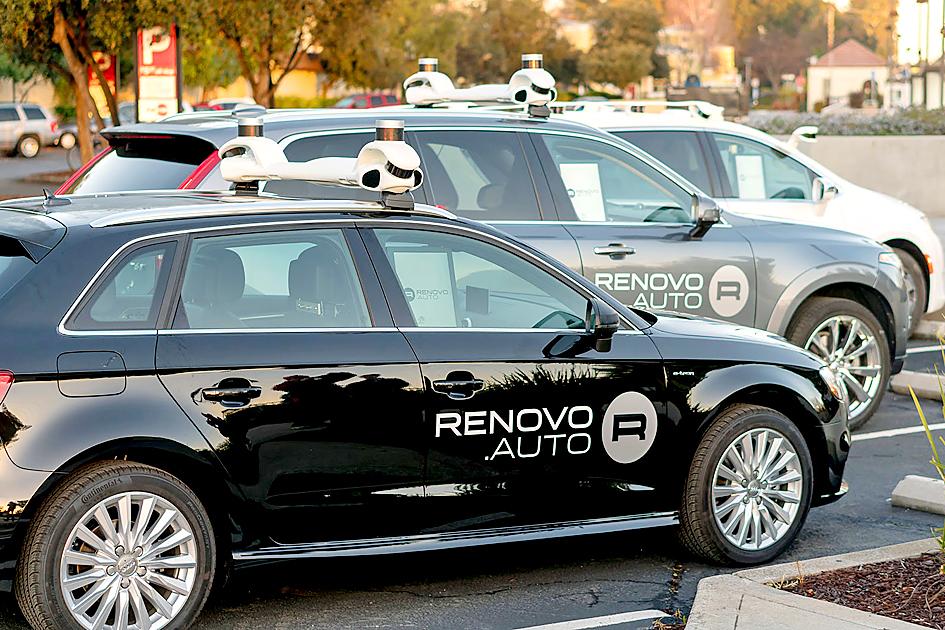Japanese automaker Toyota Motor Corp is boosting acquisitions in mobility technology, adding Renovo Motors Inc, a Silicon Valley software developer, to its Woven Planet Holdings team, which is working on automated driving.
The addition, announced yesterday, follows the purchase earlier this year of CARMERA Inc, a US venture that specializes in sophisticated road-mapping updates made cheaper and faster by using crowdsourced information obtained from millions of Internet-connected Toyota vehicles.
The company has not disclosed the value of either deal.

Photo: AP
Renovo develops automotive operating systems, which Toyota sees as essential to develop programmed vehicles so it can transition to what it calls “a mobility company” that includes more than just cars.
Renovo means “renew” in Latin.
Renovo’s data-management platform enables automakers to continuously learn from their vehicles, using a so-called “complete loop” approach, so vehicles can be made safer and more reliable.
“In Woven Planet and Toyota, we’ve found partners committed to doing exactly what we have always wanted to do on a global scale and that’s a great feeling,” Renovo chief executive officer Christopher Heiser said.
Woven Planet, a wholly owned subsidiary of Toyota, earlier acquired San Francisco-based Lyft Inc’s self-driving division Level 5.
Woven Planet chief executive officer James Kuffner said that more acquisitions might be on the way.
“The big picture is Woven Planet creating a ‘dream team’ of software and vehicle engineering people globally to deliver the world’s programmable and safest mobility,” Kuffner told reporters. “That’s the context.”
“Always as an executive, you are trying to balance the speed and the growth versus the focus and maintaining company culture,” he said. “The larger you grow, the risk is that you slow down.”
“We will keep growing, but we are going to be careful,” he said.
Kuffner declined to comment on an incident at the Paralympics Athletes Village in Tokyo last month, when a Toyota bus equipped with automated driving technology bumped into a Paralympian athlete and injured him.
The incident is still under investigation and might be an example of the kinds of hurdles to be overcome before the technology can be widely used on public roads.
The bus is not approved for widespread use on public roads, but was shuttling athletes and officials at the site during the Tokyo Olympics and Paralympics.
A human driver was on the vehicle as a safety precaution.
Toyota president Akio Toyoda has apologized and promised improvements.
Major automakers are working on various driving technologies.
Some analysts say that companies should avoid suggesting that vehicles with such technology can safely drive themselves.
Woven Planet, known previously as the Toyota Research Institute, is working on technologies spanning smart cities, green energy and mobility solutions, and robotics that are meant to eventually become consumer products, said Kuffner, who has worked on Google’s self-driving vehicles and robots at Boston Dynamics Inc.

China’s Huawei Technologies Co (華為) plans to start mass-producing its most advanced artificial intelligence (AI) chip in the first quarter of next year, even as it struggles to make enough chips due to US restrictions, two people familiar with the matter said. The telecoms conglomerate has sent samples of the Ascend 910C — its newest chip, meant to rival those made by US chipmaker Nvidia Corp — to some technology firms and started taking orders, the sources told Reuters. The 910C is being made by top Chinese contract chipmaker Semiconductor Manufacturing International Corp (SMIC, 中芯) on its N+2 process, but a lack

NVIDIA PLATFORM: Hon Hai’s Mexican facility is to begin production early next year and a Taiwan site is to enter production next month, Nvidia wrote on its blog Hon Hai Precision Industry Co (鴻海精密), the world’s biggest electronics manufacturer, yesterday said it is expanding production capacity of artificial intelligence (AI) servers based on Nvidia Corp’s Blackwell chips in Taiwan, the US and Mexico to cope with rising demand. Hon Hai’s new AI-enabled factories are to use Nvidia’s Omnivores platform to create 3D digital twins to plan and simulate automated production lines at a factory in Hsinchu, the company said in a statement. Nvidia’s Omnivores platform is for developing industrial AI simulation applications and helps bring facilities online faster. Hon Hai’s Mexican facility is to begin production early next year and the

Who would not want a social media audience that grows without new content? During the three years she paused production of her short do-it-yourself (DIY) farmer’s lifestyle videos, Chinese vlogger Li Ziqi (李子柒), 34, has seen her YouTube subscribers increase to 20.2 million from about 14 million. While YouTube is banned in China, her fan base there — although not the size of YouTube’s MrBeast, who has 330 million subscribers — is close to 100 million across the country’s social media platforms Douyin (抖音), Sina Weibo (新浪微博) and Xiaohongshu (小紅書). When Li finally released new videos last week — ending what has

AVIATION BOOM: CAL is to renew its passenger and cargo fleets starting next year on record profits as aviation continues to return to pre-pandemic levels China Airlines Ltd (CAL, 中華航空) yesterday said it is optimistic about next year’s business outlook, as the airline continues to renew its fleet on expectations that global passenger traffic would maintain steady growth and air cargo demand would remain strong. From next year to 2028, the airline is to welcome a new Boeing Co 787 fleet — 18 787-9 and six 787-10 passenger aircraft — to cover regional and medium to long-haul destinations, CAL chairman Hsieh Shih-chien (謝世謙) said at an investors’ conference in Taipei. The airline would also continue to introduce Airbus SE 321neo passenger planes and Boeing 777F cargo jets,